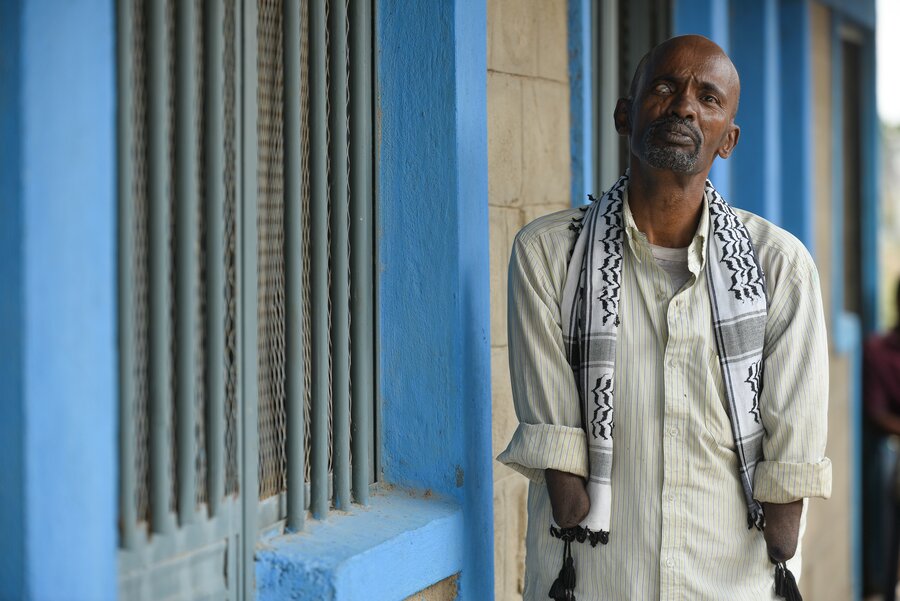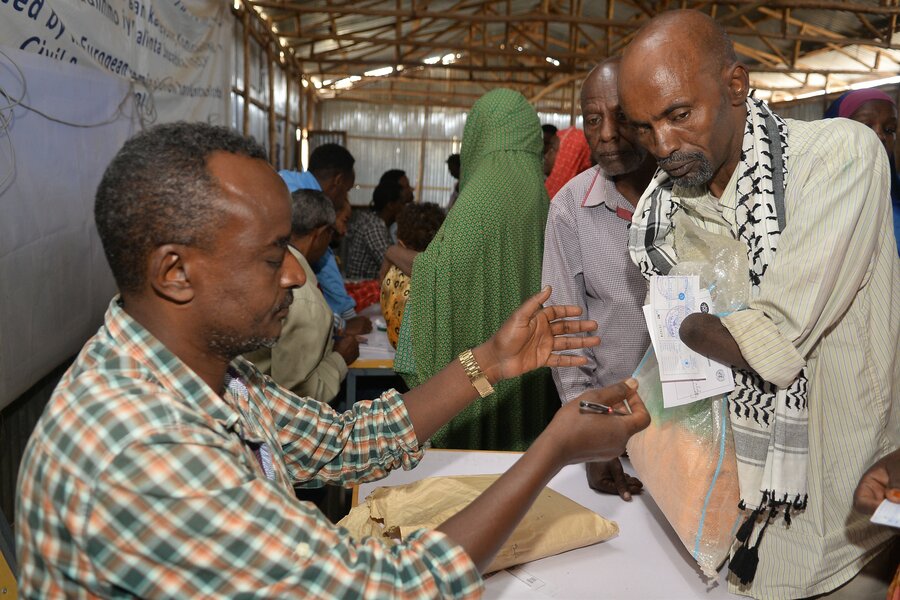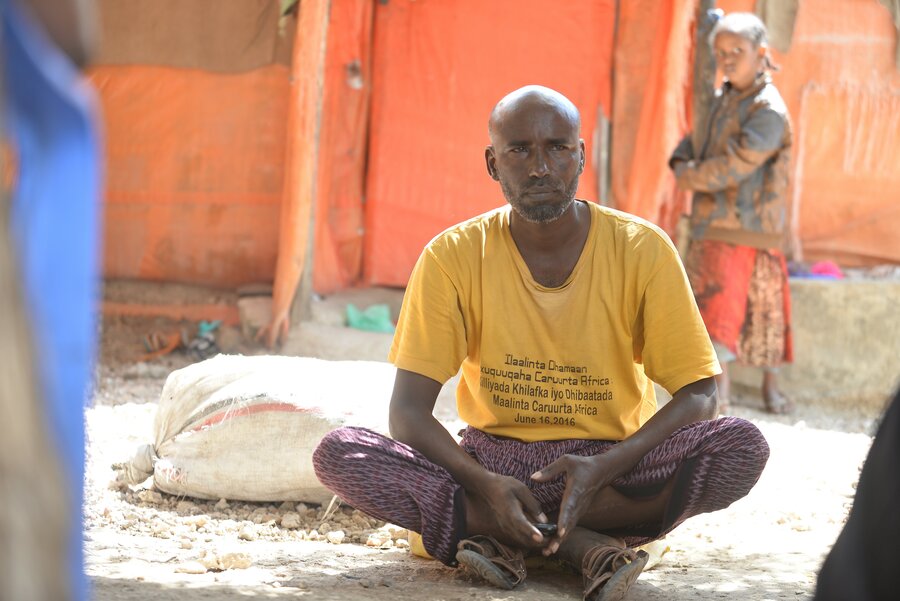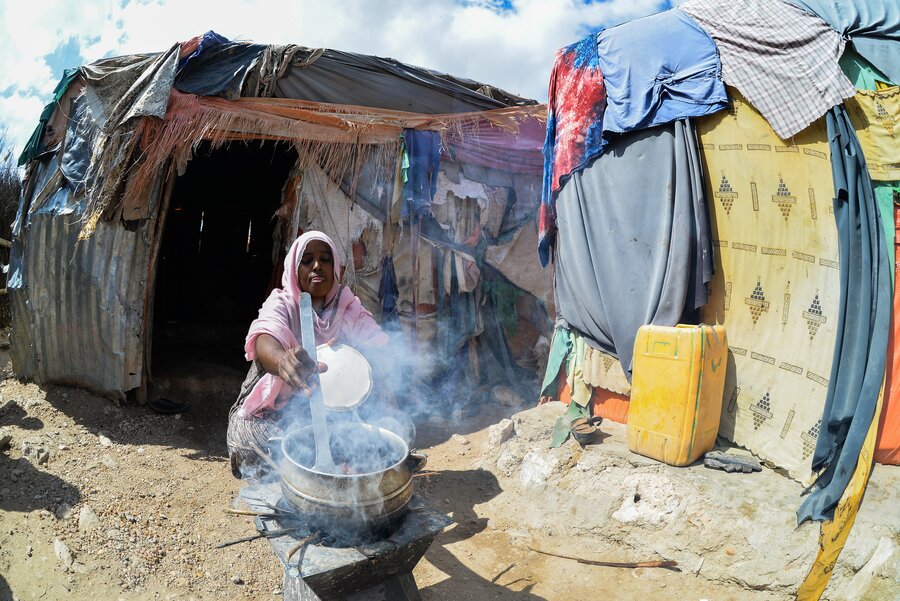The entire neighbourhood died, one after the other

Ahmed Ali Jana worked in water supplies before the war broke out in Somalia in 1991.
One day in 1994, a grenade exploded in front of him and he lost his arms and one eye.
It also killed his two children, totally changing the course of his life.
As the war reached its peak, Ahmed saw almost the entire neighbourhood in Mogadishu abandoning their homes one by one. Those who stayed behind were dying, one after the other.

Ahmed's only option was to flee to find sanctuary in Ethiopia.
‘The fact that I live in peace here is important.'
He does not elaborate in detail, but somehow he made the arduous 1,400 km-plus journey by foot and road, to arrive at the sprawling Shedder Camp in Ethiopia's Somali Region nine years ago. Here he was met by staff from the World Food Programme (WFP) and other aid workers, who gave him food and shelter. He also receives cash from WFP so he can choose some of his own food.
"The fact that I live in peace here is important, but I feel like the food WFP provides me with is also equally important. I'm grateful for that," said Ahmed.
In the same year Ahmed came to Ethiopia, thousands of others also crossed the Ethiopian border to escape Somalia's bloody conflict.
‘There was only one way to save his life.'
Among them was Hussein Abdulahi Badi, a farmer in his home country. Al-Shabab had brutally killed his wife, and he knew it was his turn next. He also knew there was only one way to save his life.
"It took me four days on foot and by truck to cross the border and reach here," said Hussein.

After several years Hussein remarried and became a father of two, the family are now all supported by WFP's food assistance. The food comprises cereals, pulses, vegetable oil, sugar and iodized salt. WFP also provides cash, nutritional supplements, school meals and training in livelihood activities such as setting up small shops.
However, WFP is funded entirely by donations from governments, companies and private individuals, and the support that WFP can provide to refugees like Ahmed and Hussein has been affected by shortfalls in funding in recent years.
Refugees have not received a full ration since late 2015, while WFP was forced to cut rations by 40 percent in most camps between May and August this year.
‘The food we used to get every month is reduced almost by half.'
WFP immediately requires US$42 million for 700,000 refugees in Gambella, Tigray, Afar, Benishangul Gumuz and Oromia regions, as well as Somali Region, between December and next May.
Currently refugees are receiving only 80 percent of the daily kilo calories needed to sustain an average person, and the effects are showing. Camps with poor nutrition results account for about 80 percent of the total refugees that Ethiopia is currently hosting.
"The food we used to get every month is reduced almost by half and is not even enough for two weeks for myself and family," says Hussein.
Further or deeper rations cuts will worsen malnutrition rates in the camps and put refugees' lives and livelihoods at risk.
‘Girls as young as 14 are forced to marry for the sake of the dowry payment.'
Ration cuts are causing other harmful effects too. WFP has reports of children dropping out of school for child marriage or to earn money. This is concerning for the welfare of these children, while also threatening to undo efforts to encourage education in the camps and to help families escape the cycle of poverty.
WFP also has reports of people leaving Shedder Camp to head for the Middle East. This migration places them at an increased risk and could complicate an already fragile security situation across Ethiopia and beyond.

"Nowadays girls as young as 14 are forced to marry for the sake of the dowry payment and 14–20 year-old boys stop schooling to try their best to get to Europe," says Mehanit Mulugeta, WFP Desk Officer in the Government's Administration for Refugees and Returnees (ARRA) at Shedder Camp.
‘I wish those who are giving us food could also see the dire situation we are in.'
For Zeineb Abdi Ahmed, who arrived in Shedder Camp in 2010, ration cuts now mean the amount of food she's getting may only be enough for a week rather than a month.
"The cash is too little to be called a supplement as there is already a big cut on our ration," she explains.
Like the vast majority of refugees, Zeineb only wants to return home and find work that can bring food to the table.
"But until then, I wish those who are giving us food could also see the dire situation we are in."
